Heat pump water heaters poised for growth in commercial markets
Energy-efficient technology becoming more mainstream.
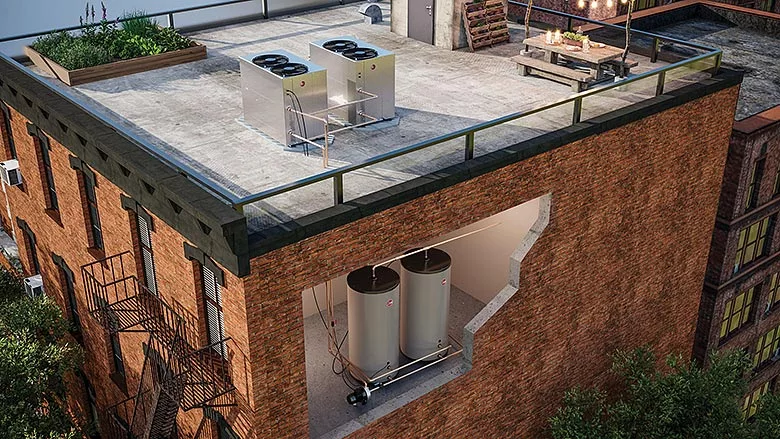
Rheem’s commercial heat pump split system suits most mild climates and is tested as high as 140° F with automatic defrost for lower temps down to 41° F, providing max hot water outlet temperature up to 149° F.
As natural gas rates increase and the push for more sustainable energy sources intensifies, heat pump water heaters appear poised for massive growth. States such as California and Massachusetts already have regulations prohibiting or disincentivizing gas water heaters in new construction, and New York City recently enacted similar restrictions for new construction. So, are heat pump water heaters the future of the water heating market? Maybe or maybe not — but some industry experts certainly think so.
According to a report from MarketsandMarkets, the heat pump water heater market is projected to reach $2.1 billion by 2026, with a CAGR of 6.8%.
“Due to current regulations and codes, heat pump water heaters (HPWH) have grown immensely in popularity for commercial applications,” says Ashley Pincott, marketing manager for Rheem Water Heating. “HPWH only account for about 2% of the market currently, but code updates continue to help the rise of HPWH. Modernized codes aim to reduce carbon emissions and regulate energy use. Rheem HPWH are environmentally-friendly, reduce carbon emissions by 75% and use 75% less energy. Although Rheem commercial heat pump systems are a relatively new option in the North American market, we’ve seen them help businesses in Australia save energy, save money and reduce their carbon footprint for more than a decade.”
Josh Greene, corporate vice president for government and industry affairs, A. O. Smith, notes that while commercial HPWH are still a relatively new technology, he is starting to see increased adoption.
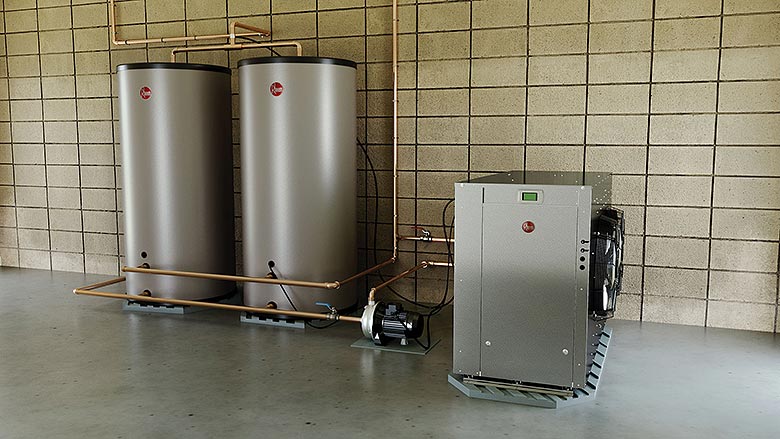
“Property owners and small business owners are looking for returns on investment, and their calculus is a little different from a residential customer, and thus, energy savings, avoided greenhouse gas emissions and operational costs are certainly considerations for commercial HPWH applications,” he says. “We’re also seeing a continued trend of companies looking to address environmental externalities — and whether that’s because they have public commitments or even private commitments related to sustainability, climate change mitigation or ESG principles — decarbonizing their assets is something they want to do on the one hand. On the other hand, regulations and building codes are driving changes. Either way, the commercial applications of heat pump water technology have great potential.”
Paul Pohl, product manager, commercial new product development at A. O. Smith Corp., agrees that government mandates are helping market adoption of HPWH in the commercial arena.
“Heat pump water heaters are definitely becoming more popular in commercial applications — government mandates are being enacted that either discourage or outlaw the use of fossil fuels, so commercial building owners are beginning to see the writing on the wall,” Pohl says. “Adoption of HPWH allows them to satisfy government mandates. They’re trending toward electrification in large measure. And all-electric water heating solutions really have a higher operating cost, and would just place too high a strain on the electrical grid. The efficiency levels of HPWH are really necessary to prevent that overload on the grid. Although that equipment is more expensive in terms of the equipment itself and installation vs. all-electric or natural gas, it does provide some significant operating cost savings vs. all-electric solutions. And it’s a non-fossil fuel alternative to natural gas.”
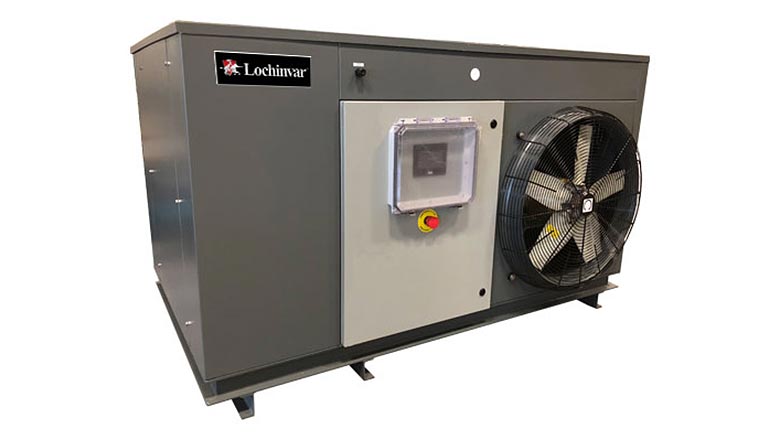
The multifamily market is another area in which HPWH are seeing a lot of growth.
“We also see HPWH growing in multifamily residential use,” Pincott says. “Rheem split systems are perfectly suited for multifamily residential applications, and we expect to see that space continue to grow based on the availability of this new technology. Rheem’s goal is to have a versatile solution that complies with any municipal codes and regulations. If a customer is focused on a high-efficiency design option that can also save money, reduce impact on the environment and positively contribute to decarbonization goals, Rheem Commercial heat pumps are an ideal choice."
Dan Rettig, product manager for Lochinvar, notes some areas are pushing heat pump technology for multifamily applications.
“They feel that’s a good area they can attack to get some of this technology implemented,” he explains. “It’s the push for decarbonization — they figure they can get the technology accepted in the multifamily vertical a lot quicker than they can in other places.”
Greene agrees, saying, “Multifamily has been identified by not only the federal but many state and local governments, as a key place in which building decarbonization efforts should gravitate. We’re seeing most of this movement in California and in the Pacific Northwest. With multifamily residential applications, the technology has great potential to make an impact.”
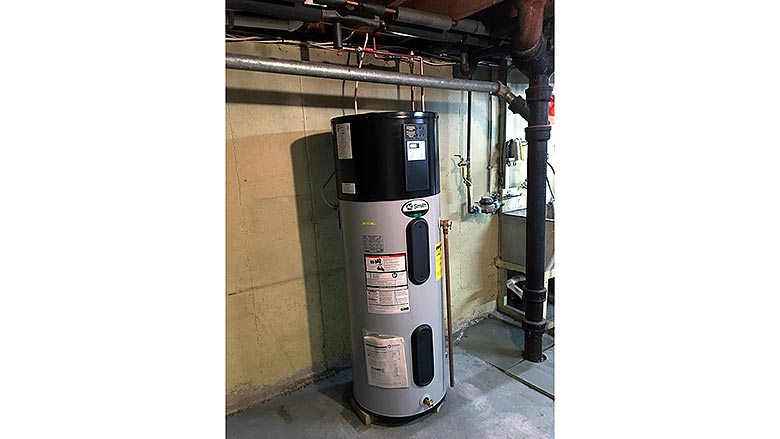
Energy reduction equals energy savings
According to Pincott, the huge draw for HPWH is the reduction in energy usage, which lowers building energy cost by 75%.
“This is one of the greenest solutions for those looking to dramatically reduce emissions as early adopters of this technology,” she says. “In some places in the country, like California and New York, these types of units are becoming the only option to meet high-efficiency goals. Rheem’s HPWHs also feature a variety of installation possibilities, including stackable models, allowing a building to decrease its system’s footprint, and there are also options including vertical and horizontal exhausts, which enable a custom fit for a wide range of layouts. Custom-designed single or multiple heat pumps and storage units meet facility performance and layout requirements.”
At the end of the day, Greene notes it is about the twin goals of energy reduction and energy savings.
“It’s about reducing operational costs, whether that be for me or you at home, or in a commercial application where costs can be considerably reduced,” Greene says. “With the reduction of the carbon footprint, we see additional benefits.”
“In a nutshell, HPWHs, although not a perfect solution, allow folks to reduce energy use and greenhouse gas emissions, improve air quality and lower their overall operating costs vs. an all-electric solution,” Pohl adds.
Market trends
Regulation changes are a primary driver in the adoption of HPWH, Pincott notes.
“Many local to state mandates are becoming stricter as more cities and regions in the United States set tight decarbonization regulations,” she explains. “Commercial water heating is affected as the industry moves from fossil fuel=burning gas to zero-emissions heat pump systems. Rheem’s commercial heat pump water heaters (split system) support requirements set forth in legislative bills SB 350, AB 758, SB 1477, AB 3232. With an ever-changing energy and decarbonization regulation landscape, many are looking beyond traditional systems for new, cutting-edge solutions. In the end, they expect a reliable performance from any unit and hassle-free service.”
Another market trend Pincott is seeing is an interest in training.
“Since HPWH meet the requirements of codes, engineers, installers and contractors are now wanting to be well-versed in installations, operation and maintenance of these types of products. From install to maintenance, training sessions will provide answers and help the installer become familiar with evolving products and technology.”
Rettig notes that as more and more government policy mandates and building code changes come in, engineering firms that have typically specified gas appliances are now asking for help to educate their firms and engineers on heat pump solutions.
“We’re seeing requests for education for the whole industry to start understanding these products,” Rettig says. “It’s for plumbers, engineers and building owners and facility managers. There’s just a lot of education going on.”
Greene sees three main market trends impacting HPWH.
“The first is increase utilization of heat pump water heaters as a way to help with climate change mitigation, while simultaneously using them to help balance electrical loads on local distribution grids,” he says. “One of the interesting things you can do with an electric storage heat pump water heater is use that water heater as a thermal battery. The easiest way to think about this, for example, is when solar is most ubiquitous during the middle part of the day, and demand for that energy is low at your home or commercial establishment you can utilize the advanced technology of HPWH and ‘dump’ some of that excess solar energy into the storage tank of the HPWH and hold that thermal energy like a battery. This allows the grid to level off during those high peak hours, and then you can turn the water heater off, or you can do other controls with it when the homeowner or other commercial application would otherwise need that hot water later in the day. So there’s a grid resiliency piece, grid reliability piece and the thermal battery piece.”
Pohl reiterates electrification and decarbonization as the major trends driving the HPWH market.
“These are intended to reduce dependence on fossil fuels by using electricity generated from renewable energy sources in conjunction with more energy-efficient appliances such as heat pumps,” he says. “Heat pump technology is based on the principle that it’s more cost-efficient to transfer heat from existing air or water than it is to create it from scratch using a fuel source. That trend of electrification and decarbonization is really what much of this revolves around. Some folks are interested in pursuing that on their own, but frankly, right now, it’s government policy mandates and building code changes that are really driving most of the demand.”
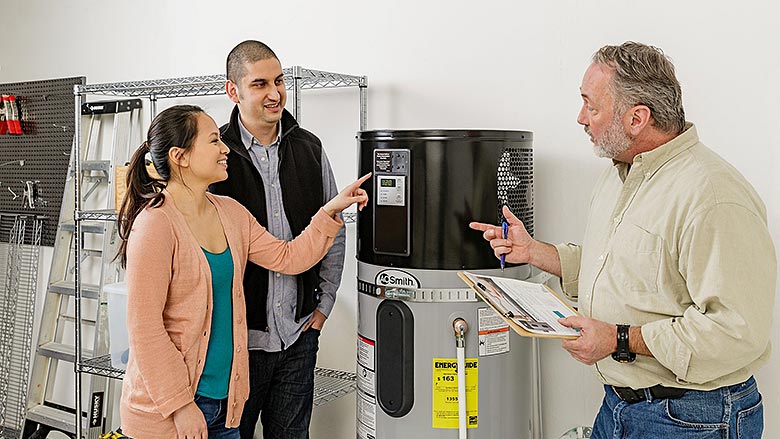
What’s next
Pincott expects to see strong growth in the HPWH category with the way the market is heading.
“As more cities and regions in the United States implement decarbonization regulations, commercial water heating will move from fossil fuel burning gas to zero-emissions heat pump systems,” she says. “California regulators (California Public Utilities Commission) have allocated $45 million to incentives for heat pump water heaters through 2025, in another step on the path toward the state’s 2045 carbon neutrality goal. Heat pump water heaters are pivotal in helping utilities, energy regulators and green building program audiences achieve decarbonization goals and reduce energy consumption.”
Greene also expects to see more technology adoption, citing the carrot and the stick of government incentives and regulations.
“Private industry is making commitments to lower carbon emissions, whether that’s in response to government policy mandates or investors,” he notes. “One of the big takeaways, specifically as it relates to technology, is the need for increased public-private partnerships. Whether that’s with financing, education, adoption or incentive programs — at the end of the day, the technology has great potential. A broad set of stakeholders are going to have to work together and find pragmatic approaches as the market transitions away from traditional water heating equipment in the installed base in the United States to HPWH, which are still a newer technology that customers, engineers and contractors are still getting their heads around as well. We’re excited about the opportunities moving forward.”
Rettig is eager to see what happens in the market over the next few years.
“I’m eager to see the changes on the engineering and design side,” he says. “For years, we’ve heard from those guys about how they need smaller gas appliances, smaller footprints because they don’t have room in the mechanical rooms. With all this new technology, everybody’s heat pumps are just bigger. That’s kind of the nature of the beast. It’s almost like now, we’re going backward and saying, ‘Hey, you need more mechanical room space for storage,’ or ‘You need more mechanical room space for the heat pump.’ I’m just eager to see how that changes their design and the layout of the buildings.”
Pohl believes the sky is the limit for these products.
“As many manufacturers continue to expand their heat pump product offerings and integrate more advanced connectivity and IoT solutions into those products, business owners and facility managers are going to have more options to save money while benefiting the environment,” he says. “With the government policy mandates — federal, state and local regulations for that matter, especially coming out of California and New York — we’re going to see more and more interest and more and more adoption of heat pumps. And that trajectory is only going to increase over time as we move forward.”
Photos courtesy of A. O. Smith, Lochinvar and Rheem Water Heating.
Looking for a reprint of this article?
From high-res PDFs to custom plaques, order your copy today!









